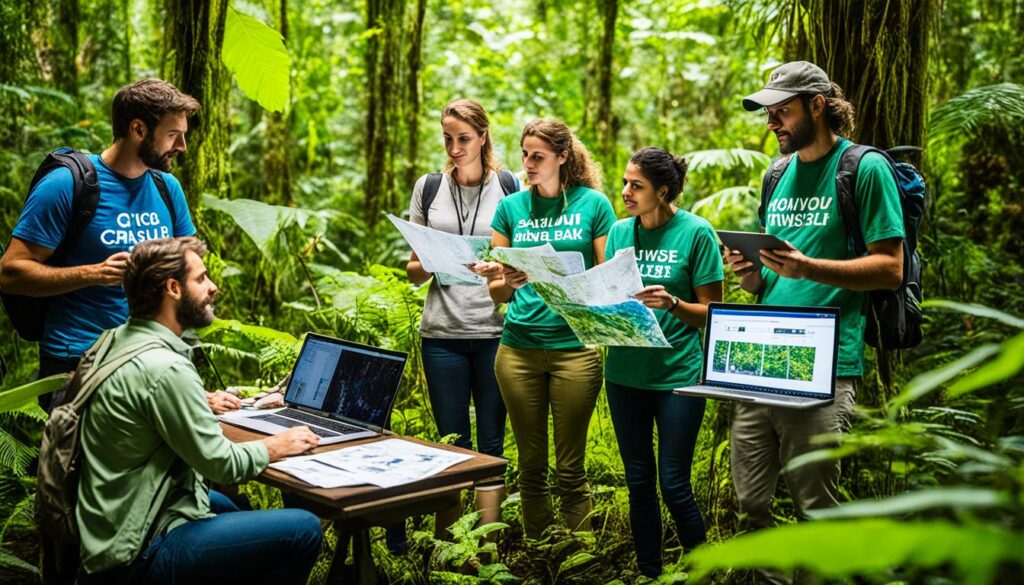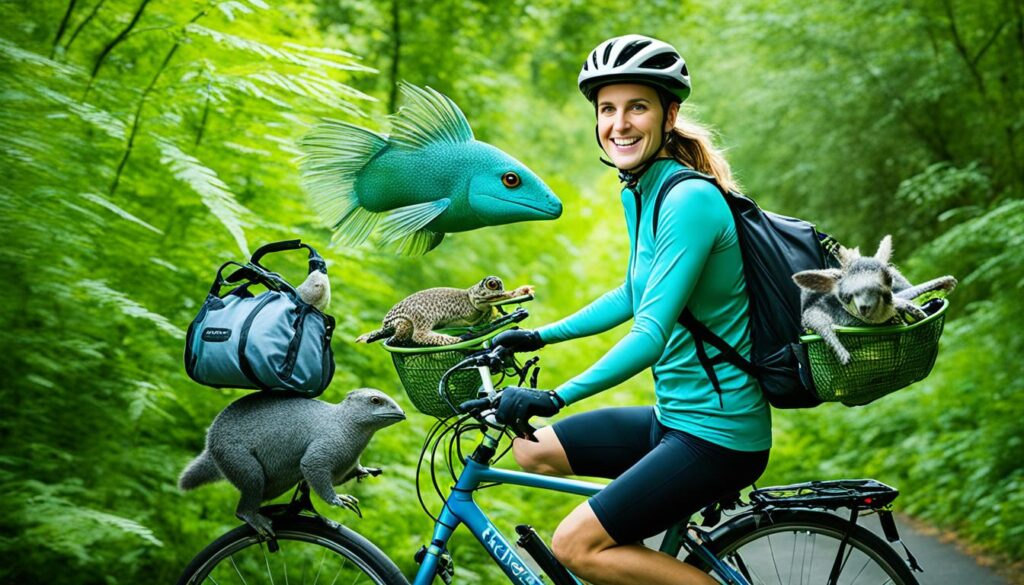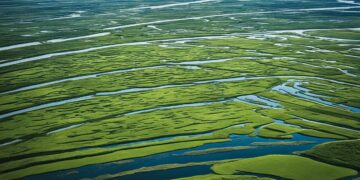The balance of nature is under threat, and endangered species need our help. We all can play a part in protecting the most vulnerable animals. This guide will show you how to make a difference in saving endangered species.
You can start by spreading the word, supporting groups that protect nature, and making eco-friendly choices. This article will give you the info and steps to help our planet’s wildlife. Together, we can keep the variety of life on Earth safe for the future.
Understanding the Plight of Endangered Species
The world’s wildlife is facing a big crisis. Many species are at risk of disappearing forever. It’s important to know why this is happening to help protect our planet’s ecosystems.
What Causes Species Extinction?
Habitat destruction is a big reason why species are going extinct. As humans grow and develop, we take over animals’ homes. This pushes them out and harms the ecosystem. Things like deforestation, building cities, and farming without care are making it hard for endangered animals to survive.
Pollution and climate change also threaten many species. Trash, plastic, and harmful gases can hurt the environment a lot. As the climate changes, many animals can’t adapt. This leads to fewer animals and a higher risk of extinction.
The Impact of Human Activities on Wildlife
Humans have greatly affected the natural world. We often put our needs before those of other species. Taking too many resources, like overfishing and illegal hunting, has hurt many animals. The demand for exotic pets and products from animals is also a big problem.
Introducing new species that don’t belong can be very bad for native animals. These new species can take over and push the local ones out. This upsets the balance in ecosystems and can lead to fewer animals.
Raising Awareness: The Power of Education
Environmental education is key to making people care and act to save endangered species. It helps young people understand why conservation matters. This way, we can raise a generation that loves and fights for our planet’s animals.
Teaching Children About Conservation
Showing kids the beauty of nature and the dangers to endangered species can change their views. With fun lessons, hands-on activities, and trips outside, we spark their interest in saving the environment. This makes them want to help protect endangered animals and our planet.
Schools, groups, and nature lovers can work together to create learning programs. These programs teach the value of different species and why we must protect them. They offer lessons in class and adventures outside, showing kids the struggles of endangered animals. This encourages them to join conservation efforts.
By focusing on environmental education, we do more than just spread the word. We grow a group of people who know, care, and will lead in saving our planet’s endangered animals. This is a strong way to bring about real change and help endangered wildlife survive longer.
Supporting Conservation Organizations
Conservation nonprofits and wildlife charities are key in protecting endangered species and their homes. They work hard to save biodiversity and fix damaged ecosystems. By helping these groups, you can really make a difference for threatened animals and plants.
These organizations focus on certain endangered species or areas. They use their knowledge and resources to create effective plans to protect them. They do research, push for policy changes, and work directly to save endangered species. Donating or volunteering with them lets you help their important work.

Supporting conservation is very impactful. Many organizations have adoption or sponsorship programs. This lets you “adopt” an endangered animal and help with its care. Others offer volunteering chances, like restoring habitats or monitoring wildlife.
By working with conservation groups, you can help save endangered species. Your help, whether money or time, lets these groups keep up their vital work. This can have a big impact on the natural world.
Animal Adoption and Sponsorship Programs
For those who love animals and want to help, adopting or sponsoring endangered species is a great way to make a difference. These programs let you support a specific animal or group of animals. Your money helps with their care and protection.
By joining these programs, you can really help endangered wildlife. Your donation supports things like fixing their homes, stopping poachers, and teaching people about conservation. These efforts are key to saving these animals.
How Your Contribution Makes a Difference
Adopting an animal or sponsoring a species is more than just giving money. It’s a way to invest in the animal’s future and its home. Your support helps keep an eye on the animal’s health and protects it from dangers.
Your involvement also spreads the word about endangered animals and why we need to save them. By telling your story and encouraging others, you help build a movement to protect our planet and its life.
Choosing to adopt a tiger, sponsor gorillas, or help a rare bird species makes a big difference. Your action helps fight to save our planet’s wildlife. By supporting these programs, you’re not just helping animals. You’re also showing you care about our planet’s future.
Reducing Your Carbon Footprint
Protecting endangered species and their homes needs us all to work together. One key way we can help is by cutting down our carbon footprint. By choosing eco-friendly habits, we can all play a big part in saving our planet’s biodiversity.
Eco-Friendly Lifestyle Choices
Start by making sustainable living a top goal. Check how much energy you use and find ways to use less. This could mean getting new, energy-saving appliances, using green energy, and smart home tech.
Also, cut down on waste by recycling, composting, and avoiding single-use plastics. This helps the planet a lot.
Think about using greener ways to get around, like walking, biking, or public transport. If you must drive, consider a fuel-efficient or electric car. And, choose products that are good for the planet when you shop.
Adding these eco-friendly habits to your everyday life helps lower the carbon footprint. It also helps protect endangered animals and their homes. Every little change we make can make a big difference for our planet.

Ethical and Sustainable Travel
Traveling responsibly helps support endangered species conservation. By choosing ethical and sustainable travel, you help protect wildlife habitats and support conservation efforts. You can do this by picking eco-friendly places to stay and joining responsible tourism activities.
Responsible Tourism and Wildlife Watching
When looking for wildlife experiences, pick ones that are ethical and sustainable. Avoid activities that could harm animals. Instead, go for tours that let you watch animals in their natural setting without disturbing them. These tours often support conservation and let you learn about protecting endangered species.
Also, think about where you stay. Pick eco-lodges or hotels that use green energy, save water, and manage waste well. This way, you lessen your impact on the planet and support places that care for the environment.
Look for tour operators and travel companies that focus on sustainability and conservation. They work with local groups and conservation groups to offer tours that are good for the planet and its creatures. By choosing these, you make sure your money helps protect endangered species and their homes.
Volunteering for Environmental Causes
If you care about protecting endangered species and their homes, think about volunteering. By helping out, you can really make a difference. This work helps keep our planet’s variety of life safe.
Volunteering is a great way to help. You can join programs that focus on fixing habitats, watching wildlife, and teaching people. By helping, you support efforts to save our planet.
There are many ways to help, whether you like getting your hands dirty or spreading the word. You can help with things like planting plants, keeping trails clear, or teaching local communities. Many groups need volunteers for these tasks.
Volunteering helps the environment and teaches you new things. You’ll meet people who care about nature just like you. It’s a great way to help endangered animals and plants, and learn about the work to protect our planet.
Advocating for Policy Changes
Protecting endangered species needs strong efforts at the policy level. We, as concerned citizens, can influence decision-makers. We can push for laws that put conservation first. By working with local and national governments, we can help make policies that protect vulnerable wildlife.
Engaging with Local and National Governments
One key way to push for policy changes is by getting involved in politics. Talk to your elected reps, go to town hall meetings, and speak up. Ask them to back laws and projects that improve endangered species legislation and support conservation policy. Also, think about joining groups focused on environmental advocacy and influencing decision-makers.
Your actions can really change things. By working with your local and national governments, you can shape policies that help endangered species and their homes. Let’s work together for a future where these amazing animals can live and not face extinction.







